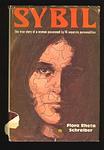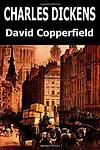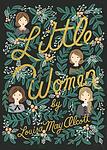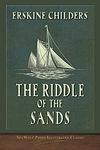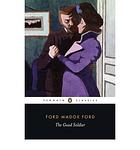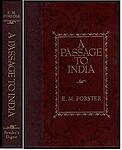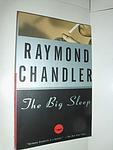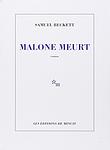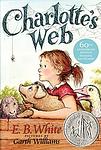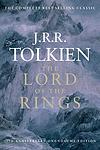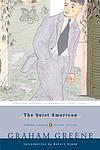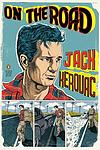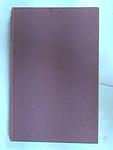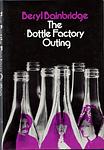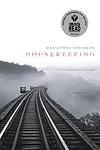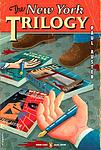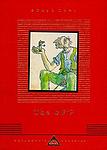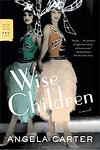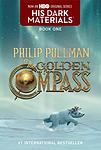The 100 Greatest Novels of All Time: The List
This is one of the 284 lists we use to generate our main The Greatest Books list.
-
Don Quixote by Miguel de Cervantes
This classic novel follows the adventures of a man who, driven mad by reading too many chivalric romances, decides to become a knight-errant and roam the world righting wrongs under the name Don Quixote. Accompanied by his loyal squire, Sancho Panza, he battles windmills he believes to be giants and champions the virtuous lady Dulcinea, who is in reality a simple peasant girl. The book is a richly layered critique of the popular literature of Cervantes' time and a profound exploration of reality and illusion, madness and sanity.
-
Pilgrim's Progress by John Bunyan
This Christian allegory follows a man named Christian on his journey from his hometown, the "City of Destruction," to the "Celestial City" on Mount Zion. Christian faces numerous obstacles and temptations along the way, including the Slough of Despond, Vanity Fair, and the Valley of the Shadow of Death. The narrative serves as a metaphor for the believer's journey from sin and despair to salvation and eternal life.
-
Robinson Crusoe by Daniel Defoe
The book is a classic adventure novel about a man who spends 28 years on a remote tropical island near Trinidad, encountering cannibals, captives, and mutineers before being rescued. The story is noted for its realistic portrayal of the protagonist's physical and psychological development and for its detailed depiction of his attempts to create a life for himself in the wilderness. The novel has been interpreted as an allegory for the development of civilization, as well as a critique of European colonialism.
-
Gulliver's Travels by Jonathan Swift
This classic satire follows the travels of a surgeon and sea captain who embarks on a series of extraordinary voyages. The protagonist first finds himself shipwrecked on an island inhabited by tiny people, later discovers a land of giants, then encounters a society of intelligent horses, and finally lands on a floating island of scientists. Through these bizarre adventures, the novel explores themes of human nature, morality, and society, offering a scathing critique of European culture and the human condition.
-
Tom Jones by Henry Fielding
This classic novel tells the story of Tom Jones, a charming and good-hearted but impulsive young man, who is expelled from his adoptive family home due to his wild behavior and love for the beautiful Sophia Western. His journey through 18th-century England is filled with adventures, misadventures, and a colorful cast of characters, as he struggles with his identity and seeks redemption. The narrative explores themes of class, virtue, and morality, and is known for its humor, social satire, and vivid characterization.
-
Clarissa by Samuel Richardson
The novel revolves around the beautiful and virtuous Clarissa Harlowe, a young woman from a wealthy family who is pursued by the villainous Robert Lovelace. Despite her attempts to maintain her virtue and independence, she is tricked into running away with Lovelace and is subsequently held against her will. Lovelace's relentless pursuit and Clarissa's steadfast resistance culminate in her tragic end, making the novel a complex exploration of power, morality, and the vulnerability of women in society.
-
Tristram Shandy by Laurence Sterne
The novel is a humorous, rambling narrative that chronicles the life of Tristram Shandy. The story is filled with digressions, anecdotes, and eccentric characters, as Tristram often interrupts his own tale to interject commentary or to recount stories from his family's past. Despite the seemingly haphazard structure, the novel is a clever exploration of narrative form and a satirical critique of traditional biographies and novels.
-
Dangerous Liaison by Pierre Choderlos de Laclos
"Dangerous Liaison" is a tale of manipulation, revenge, and seduction set in the French aristocracy before the French Revolution. The novel follows the Marquise de Merteuil and the Vicomte de Valmont, two rivals who use sex as a weapon to humiliate and degrade others, all the while enjoying their cruel games. Their targets are the virtuous (and married) Madame de Tourvel and the young Cecile de Volanges. The book is a dramatic exploration of decadence, corruption, and ultimate retribution.
-
Emma by Jane Austen
The novel revolves around Emma, a well-meaning but disaster-prone matchmaker, who ignores her own romantic feelings while setting out to find a suitor for her friend Harriet. Her efforts cause more problems than solutions as she leaves a trail of mishaps behind her. As her plans go awry, Emma realizes that she herself may be the one in love. The book is a classic exploration of social manners, love, and marriage in 19th-century England.
-
Frankenstein by Mary Shelley
This classic novel tells the story of a young scientist who creates a grotesque but sentient creature in an unorthodox scientific experiment. The scientist, horrified by his creation, abandons it, leading the creature to seek revenge. The novel explores themes of ambition, responsibility, guilt, and the potential consequences of playing God.
-
Nightmare Abbey by Thomas Love Peacock
"Nightmare Abbey" is a satirical novel that explores the world of the romantic movement in British literature. The story revolves around a melancholic young man who lives in a gloomy mansion, which serves as a gathering place for many of his eccentric friends. The protagonist's romantic woes and his friends' philosophical debates, which often mock the prevailing intellectual trends of the day, form the crux of the narrative. The novel humorously critiques the romantic ideals of love and heroism while also providing a social commentary on the intellectual pretensions of the era.
-
Black Sheep by Georgette Heyer
"Black Sheep" is a historical romance novel set in the Regency era. The story revolves around a young woman who is sent to live with her aunt in Bath after her father's death. There, she meets a man who is considered a 'black sheep' due to his scandalous past and reputation. Despite their differences, they fall in love and must navigate societal expectations and personal growth to find their happily ever after.
-
The Charterhouse of Parma by Stendhal
The novel follows the life of a young Italian nobleman, who, driven by romantic ideals and a thirst for adventure, leaves his comfortable life to join Napoleon's army. After surviving many trials and tribulations, he returns home to a life of political intrigue, love affairs, and power struggles in the court of Parma. The narrative provides a vivid and satirical depiction of the political and social life in Italy during the 19th century.
-
The Count of Monte Cristo by Alexandre Dumas
A young sailor, unjustly accused of treason, is imprisoned without trial in a grim fortress. After a daring escape, he uncovers a hidden treasure and transforms himself into the mysterious and wealthy Count of Monte Cristo. He then sets out to exact revenge on those who wronged him, using his newfound power and influence. Throughout his journey, he grapples with questions about justice, vengeance, and whether ultimate power can ultimately corrupt.
-
Sybil by Flora Rheta Schreiber
The book is a true story about a woman who, after suffering severe physical and emotional abuse as a child, developed sixteen different personalities as a coping mechanism. The narrative follows her journey with her psychiatrist as they attempt to fuse her multiple identities into one through therapy and treatment. The book offers an in-depth look at Dissociative Identity Disorder, its causes, manifestations, and treatment.
-
David Copperfield by Charles Dickens
This novel follows the life of its titular protagonist from his childhood to maturity. Born to a young widow, David endures a difficult childhood when his mother remarries a harsh and abusive man. After his mother's death, he is sent to a boarding school before being forced into child labor. As he grows, David experiences hardship, love, and loss, all the while meeting a colorful array of characters. The novel is a journey of self-discovery and personal growth, showcasing the harsh realities of 19th-century England.
-
Wuthering Heights by Emily Brontë
This classic novel is a tale of love, revenge and social class set in the Yorkshire moors. It revolves around the intense, complex relationship between Catherine Earnshaw and Heathcliff, an orphan adopted by Catherine's father. Despite their deep affection for each other, Catherine marries Edgar Linton, a wealthy neighbor, leading Heathcliff to seek revenge on the two families. The story unfolds over two generations, reflecting the consequences of their choices and the destructive power of obsessive love.
-
Jane Eyre by Charlotte Bronte
The novel follows the life of Jane Eyre, an orphan who is mistreated by her relatives and sent to a charity school. As she grows up, Jane becomes a governess at Thornfield Hall, where she falls in love with the brooding and mysterious Mr. Rochester. However, she soon learns of a dark secret in his past that threatens their future together. The story is a profound exploration of a woman's self-discovery and her struggle for independence and love in a rigid Victorian society.
-
Vanity Fair by William Makepeace Thackeray
This classic novel follows the lives of two contrasting women, the cunning and ruthless Becky Sharp and the sweet and naive Amelia Sedley, against the backdrop of English society during the Napoleonic Wars. The book is a satirical exploration of the obsession with wealth, status, and social climbing, and the moral bankruptcy that can result from such pursuits. The narrative weaves an intricate tale of love, betrayal, and redemption, exposing the vanity and hypocrisy of high society.
-
The Scarlet Letter by Nathaniel Hawthorne
Set in 17th-century Puritan Boston, this novel tells the story of a woman who conceives a daughter through an affair and struggles to create a new life of repentance and dignity. She is forced to wear a scarlet "A" on her dress as a sign of her adultery while her lover, a revered local minister, remains unnamed and unpunished. Throughout the book, themes of sin, legalism, and guilt are explored.
-
Moby Dick by Herman Melville
The novel is a detailed narrative of a vengeful sea captain's obsessive quest to hunt down a giant white sperm whale that bit off his leg. The captain's relentless pursuit, despite the warnings and concerns of his crew, leads them on a dangerous journey across the seas. The story is a complex exploration of good and evil, obsession, and the nature of reality, filled with rich descriptions of whaling and the sea.
-
Madame Bovary by Gustave Flaubert
Madame Bovary is a tragic novel about a young woman, Emma Bovary, who is married to a dull, but kind-hearted doctor. Dissatisfied with her life, she embarks on a series of extramarital affairs and indulges in a luxurious lifestyle in an attempt to escape the banalities and emptiness of provincial life. Her desire for passion and excitement leads her down a path of financial ruin and despair, ultimately resulting in a tragic end.
-
The Woman in White by Wilkie Collins
A captivating tale of mystery and suspense, "The Woman in White" follows the story of a young art teacher, Walter Hartright, who encounters a mysterious woman dressed in white on a moonlit road. The woman is revealed to be a mental asylum escapee, and as Hartright delves into her story, he uncovers a web of deceit, madness, and dangerous secrets involving a wealthy, titled family. The narrative explores themes of identity, insanity, and the abuse of power, with a complex plot filled with twists and turns.
-
Alice's Adventures in Wonderland by Lewis Carroll
This novel follows the story of a young girl named Alice who falls down a rabbit hole into a fantastical world full of peculiar creatures and bizarre experiences. As she navigates through this strange land, she encounters a series of nonsensical events, including a tea party with a Mad Hatter, a pool of tears, and a trial over stolen tarts. The book is renowned for its playful use of language, logic, and its exploration of the boundaries of reality.
-
Little Women by Louisa May Alcott
This classic novel follows the lives of the four March sisters - Meg, Jo, Beth, and Amy - as they navigate the challenges and joys of adolescence and adulthood in 19th century New England. As they grow, they grapple with issues of poverty, gender roles, love, and personal identity, each in her own unique way. The story is a testament to the power of family, sisterhood, and female resilience in a time of societal constraints.
-
The Way We Live Now by Anthony Trollope
The book is a satirical analysis of the moral corruption in London during the 1870s. It centers around Augustus Melmotte, a fraudulent financier, who moves his family to London in an attempt to climb the social ladder. His daughter, Marie, falls in love with Sir Felix Carbury, a penniless playboy, while his wife is desperate to be accepted into London society. The book explores themes of wealth, power, love, and greed, and is a biting critique of the era's obsession with status and money.
-
Anna Karenina by Leo Tolstoy
Set in 19th-century Russia, this novel revolves around the life of Anna Karenina, a high-society woman who, dissatisfied with her loveless marriage, embarks on a passionate affair with a charming officer named Count Vronsky. This scandalous affair leads to her social downfall, while parallel to this, the novel also explores the rural life and struggles of Levin, a landowner who seeks the meaning of life and true happiness. The book explores themes such as love, marriage, fidelity, societal norms, and the human quest for happiness.
-
Daniel Deronda by George Eliot
"Daniel Deronda" is a novel that explores the intersecting lives of its two main characters: Gwendolen Harleth, a beautiful but shallow young woman who is forced into an oppressive marriage to escape poverty, and Daniel Deronda, a compassionate and intelligent young man who, after being raised by a wealthy English gentleman, discovers his Jewish heritage. The story delves into themes of love, identity, and moral responsibility, set against the backdrop of Victorian England's societal norms and prejudices.
-
The Brothers Karamazov by Fyodor Dostoevsky
This classic novel explores the complex, passionate, and troubled relationship between four brothers and their father in 19th century Russia. The narrative delves into the themes of faith, doubt, morality, and redemption, as each brother grapples with personal dilemmas and family conflicts. The story culminates in a dramatic trial following a murder, which serves as a microcosm of the moral and philosophical struggles faced by each character, and by extension, humanity itself.
-
The Portrait of a Lady by Henry James
This classic novel explores the life of a young, independent American woman who inherits a large amount of money and moves to Europe, where she falls into a manipulative and oppressive marriage. The story delves into themes of personal freedom, responsibility, and betrayal, as the protagonist navigates the complexities of high society, love, and the consequences of her choices.
-
The Adventures of Huckleberry Finn by Mark Twain
The novel follows the journey of a young boy named Huckleberry Finn and a runaway slave named Jim as they travel down the Mississippi River on a raft. Set in the American South before the Civil War, the story explores themes of friendship, freedom, and the hypocrisy of society. Through various adventures and encounters with a host of colorful characters, Huck grapples with his personal values, often clashing with the societal norms of the time.
-
The Strange Case of Dr. Jekyll and Mr. Hyde by Robert Louis Stevenson
This classic novel explores the duality of human nature through the story of a respected London doctor who creates a potion that transforms him into a sinister, violent alter ego. As the doctor increasingly loses control over when the transformations occur, his alter ego's evil deeds escalate, causing havoc in the community. The narrative is a chilling exploration of humanity's capacity for evil and the struggle for individuals to reconcile their public personas with their private desires.
-
Three Men in a Boat by Jerome K. Jerome
Three Men in a Boat is a comedic account of a two-week boating holiday on the Thames River from Kingston upon Thames to Oxford and back to Kingston. The story follows three friends and a dog who decide to take a trip to cure their hypochondriac symptoms. The journey is filled with humorous incidents, historical digressions, and comical misunderstandings. Despite their initial intentions, the trio's holiday turns into a series of misadventures, providing a light-hearted commentary on the English upper-middle class at the end of the 19th century.
-
The Picture of Dorian Gray by Oscar Wilde
The novel follows the life of a handsome young man who, after having his portrait painted, is upset to realize that the painting will remain beautiful while he ages. After expressing a wish that the painting would age instead of him, he is shocked to find that his wish comes true. As he indulges in a life of hedonism and immoral acts, his portrait becomes increasingly grotesque, reflecting the damage his actions have on his soul. The story serves as a cautionary tale about the dangers of vanity, selfishness, and the pursuit of pleasure without regard for consequences.
-
The Diary of a Nobody by George Grossmith, Weedon Grossmith
"The Diary of a Nobody" is a humorous account of the daily life of Charles Pooter, a middle-class clerk living in London. The novel, written in diary format, details Pooter's experiences, social anxieties, and domestic issues with a comic touch. His encounters with tradesmen, his social gaffes, and his relationship with his son, who has a very different lifestyle, form the crux of the story. Despite the mundane nature of his life, Pooter's self-importance and serious demeanor contribute to the humor and charm of the book.
-
Jude the Obscure by Thomas Hardy
This novel tells the story of Jude Fawley, a working-class young man who dreams of becoming a scholar. The traditional class structure in 19th-century England prevents him from realizing his dream and his only solace is his love for his cousin, Sue Bridehead. Their scandalous relationship and the tragic events that follow form the heart of the narrative, which explores themes of love, class, religion, and morality.
-
Riddle of the Sands by Erskine Childers
This novel is a classic early 20th-century spy thriller that follows two British yachtsmen who stumble upon a German plot to invade England while on a sailing trip in the North Sea. The duo must use their wits and sailing skills to outmaneuver the Germans and alert the British government of the impending attack. The book is notable for its attention to detail and realism, particularly in its descriptions of sailing and the North Sea coastline.
-
The Call of the Wild by Jack London
This book tells the story of a domesticated dog named Buck who is stolen from his home in California and sold into service as a sled dog in Alaska. As he faces harsh conditions and brutal treatment, Buck must learn to adapt to the wild and harsh environment, ultimately reverting to his ancestral instincts in order to survive. The book explores themes of nature versus nurture, civilization versus wilderness, and the struggle for dominance.
-
Nostromo by Joseph Conrad
Set in the fictional South American country of Costaguana, the novel explores the turbulent political and social changes of the era through the eyes of Nostromo, a respected and resourceful Italian expatriate. Nostromo's loyalty and heroism are tested when he is tasked with hiding a cache of silver from a revolutionary government. As the political landscape shifts, he finds himself caught in a web of moral dilemmas and life-altering decisions. The novel is a profound examination of power, corruption, and the human condition.
-
The Wind in the Willows by Kenneth Grahame
"The Wind in the Willows" is a charming tale about the adventures of four anthropomorphic animal friends - Mole, Rat, Badger, and the rebellious and extravagant Toad. The story is set in the idyllic English countryside and explores themes of friendship, exploration, and respect for nature. The narrative is marked by Toad's reckless behavior, his obsession with motor cars, and his eventual redemption. The other characters, with their contrasting personalities, bring balance and depth to the story.
-
In Search of Lost Time by Marcel Proust
This renowned novel is a sweeping exploration of memory, love, art, and the passage of time, told through the narrator's recollections of his childhood and experiences into adulthood in the late 19th and early 20th century aristocratic France. The narrative is notable for its lengthy and intricate involuntary memory episodes, the most famous being the "madeleine episode". It explores the themes of time, space and memory, but also raises questions about the nature of art and literature, and the complex relationships between love, sexuality, and possession.
-
The Rainbow by D. H. Lawrence
The novel explores the lives of three generations of a farming family, the Brangwens, living in rural England in the late 19th and early 20th century. The narrative primarily focuses on the sexual and emotional maturation of Ursula Brangwen, a young woman who rejects traditional societal norms in her quest for spiritual fulfillment and personal independence. The book is known for its vivid depiction of the English countryside and its frank portrayal of sexual desire.
-
The Good Soldier by Ford Madox Ford
"The Good Soldier" is a tragic tale of two seemingly perfect couples: an American couple and an English couple, who meet at a German spa and share a nine-year friendship. However, underneath the surface, their relationships are far from ideal, filled with infidelity, lies, and deceit. The story is narrated by the American husband, who is the last to realize the intricate web of affairs and betrayals amongst the group. The novel explores themes of love, passion, and the destruction that can result from suppressed emotions and societal pressures.
-
The Thirty-Nine Steps by John Buchan
Set on the eve of World War I, the novel follows an ordinary man who becomes entangled in a dangerous plot after a mysterious stranger shows up at his apartment, claiming to be a spy. When the stranger is murdered, the protagonist is falsely accused and becomes a fugitive, fleeing to the Scottish highlands. He must unravel a conspiracy of international espionage and prevent a political assassination to clear his name.
-
Ulysses by James Joyce
Set in Dublin, the novel follows a day in the life of Leopold Bloom, an advertising salesman, as he navigates the city. The narrative, heavily influenced by Homer's Odyssey, explores themes of identity, heroism, and the complexities of everyday life. It is renowned for its stream-of-consciousness style and complex structure, making it a challenging but rewarding read.
-
Mrs. Dalloway by Virginia Woolf
The novel chronicles a day in the life of Clarissa Dalloway, a high-society woman in post-World War I England, as she prepares for a party she is hosting that evening. Throughout the day, she encounters various characters from her past, including a former suitor and a shell-shocked war veteran. The narrative jumps back and forth in time and in and out of different characters' minds, exploring themes of mental illness, existentialism, and the nature of time.
-
A Passage to India by E. M. Forster
The novel takes place in British-ruled India, where the cultural divide between the British and the Indians is explored. The story focuses on the experiences of an Indian Muslim, Dr. Aziz, and his interactions with an English woman, Miss Quested, and her elderly friend, Mrs. Moore. After an expedition to the Marabar Caves, Miss Quested accuses Dr. Aziz of assault, leading to a trial that deepens the racial tensions and prejudices between the colonizers and the colonized. The novel is a critique of British imperialism and a study of the cultural and racial misunderstandings and ill-will between the British and the Indian people.
-
The Great Gatsby by F. Scott Fitzgerald
Set in the summer of 1922, the novel follows the life of a young and mysterious millionaire, his extravagant lifestyle in Long Island, and his obsessive love for a beautiful former debutante. As the story unfolds, the millionaire's dark secrets and the corrupt reality of the American dream during the Jazz Age are revealed. The narrative is a critique of the hedonistic excess and moral decay of the era, ultimately leading to tragic consequences.
-
The Trial by Franz Kafka
The book revolves around a bank clerk who wakes one morning to find himself under arrest for an unspecified crime. Despite not being detained, he is subjected to the psychological torment of a bizarre and nightmarish judicial process. The story is a critique of bureaucracy, exploring themes of guilt, alienation and the inefficiency of the justice system.
-
Men Without Women by Ernest Hemingway
"Men Without Women" is a collection of short stories that explore the theme of loneliness and emotional isolation. Each of the fourteen stories focuses on men who have lost or can't attain the love of a woman, resulting in feelings of despair, alienation and loneliness. The characters range from matadors to boxers, soldiers to artists, all of whom are navigating the complexities of masculinity, love, and life.
-
Journey to the End of The Night by Louis-Ferdinand Céline
The novel is a semi-autobiographical work that explores the harsh realities of life through the cynical and disillusioned eyes of the protagonist. The narrative follows his experiences from the trenches of World War I, through the African jungles, to the streets of America and the slums of Paris, showcasing the horrors of war, colonialism, and the dark side of human nature. The protagonist's journey is marked by his struggle with despair, loneliness, and the absurdity of existence, offering a bleak yet profound commentary on the human condition.
-
As I Lay Dying by William Faulkner
The narrative unfolds through the eyes of 15 different characters over 59 chapters. It is the story of the death of Addie Bundren and her poor, rural family's quest and motivations—noble or selfish—to honor her wish to be buried in her hometown of Jefferson, Mississippi. As the Bundren family undertakes a journey to fulfill Addie's last wish, they face many hardships and personal revelations. The novel explores themes of existentialism, death, and the nature of family relationships.
-
Brave New World by Aldous Huxley
Set in a dystopian future, the novel explores a society where human beings are genetically bred and pharmaceutically conditioned to serve in a ruling order. The society is divided into five castes, each with its specific roles. The narrative follows a savage who rejects the norms of this new world order and struggles to navigate the clash between the values of his upbringing and the reality of this technologically advanced, emotionless society. His resistance prompts a deep examination of the nature of freedom, individuality, and happiness.
-
Scoop by Evelyn Waugh
"Scoop" is a satirical novel that explores the world of journalism through the lens of an accidental war correspondent. The protagonist, a nature columnist, is mistakenly sent to cover a war in Africa due to a mix-up at a newspaper office. The book humorously depicts his struggles and mishaps as he navigates the chaotic world of war reporting, providing a critique of sensationalist journalism and the often absurd nature of international news.
-
U.S.A. Trilogy by John Dos Passos
The U.S.A. Trilogy is a series of three novels that chronicle the lives of various characters in the first half of the 20th century in the United States. The narrative intertwines the stories of twelve characters as they navigate the societal changes and upheavals of the era, including World War I, the Great Depression, and the rise of Hollywood. The author uses a unique narrative technique that combines traditional prose, newspaper-style headlines, biographies, and stream-of-consciousness writing to paint a vivid picture of American life during this period.
-
The Big Sleep by Raymond Chandler
In this classic detective novel, a private investigator is hired by a wealthy family to resolve a blackmail issue involving the younger daughter. As he delves deeper into the case, he uncovers a web of deceit, murder, and organized crime. The detective's investigation is further complicated by his growing attraction to the older daughter, adding a layer of personal involvement to an already complex case. The novel is renowned for its gritty depiction of 1930s Los Angeles and its sharp, witty dialogue.
-
The Pursuit Of Love by Nancy Mitford
The Pursuit of Love is a semi-autobiographical novel that follows the romantic escapades of the eccentric and aristocratic Radlett family, primarily through the eyes of cousin Fanny. The story centers on Linda, the most beautiful and free-spirited of the Radlett daughters, who embarks on a journey of self-discovery through her various relationships and marriages. The novel explores themes of love, marriage, and the societal expectations of women during the interwar period in England.
-
The Plague by Albert Camus
The novel is set in the Algerian city of Oran during the 1940s, where a deadly plague sweeps through, causing the city to be quarantined. The story is told through the eyes of a doctor who witnesses the horror and suffering caused by the disease. The narrative explores themes of human resilience, solidarity, and the struggle against the absurdities of life. It also examines how individuals and society respond to death and disease, creating a profound meditation on the nature of existence and human endurance.
-
Nineteen Eighty Four by George Orwell
Set in a dystopian future, the novel presents a society under the total control of a totalitarian regime, led by the omnipresent Big Brother. The protagonist, a low-ranking member of 'the Party', begins to question the regime and falls in love with a woman, an act of rebellion in a world where independent thought, dissent, and love are prohibited. The novel explores themes of surveillance, censorship, and the manipulation of truth.
-
Malone Dies by Samuel Beckett
"Malone Dies" is a narrative that delves into the mind of an elderly man who lies in a decrepit room, slowly dying. Throughout the novel, the protagonist grapples with his impending demise, while reflecting on his past. He also creates characters and stories within his mind to cope with his solitude and despair. The novel, characterized by its stream-of-consciousness style and bleak outlook, is a profound exploration of the human condition, mortality, and the nature of existence.
-
The Catcher in the Rye by J. D. Salinger
The novel follows the story of a teenager named Holden Caulfield, who has just been expelled from his prep school. The narrative unfolds over the course of three days, during which Holden experiences various forms of alienation and his mental state continues to unravel. He criticizes the adult world as "phony" and struggles with his own transition into adulthood. The book is a profound exploration of teenage rebellion, alienation, and the loss of innocence.
-
Wise Blood by Flannery O'Connor
"Wise Blood" is a novel about a young man named Hazel Motes, who returns home to Tennessee after serving in World War II and finds his religious beliefs shaken. He becomes a street preacher, founding the Church Without Christ to preach his message of faithlessness. The book explores themes of redemption, faith, and the struggle between belief and atheism as Hazel interacts with a variety of eccentric characters and faces his own internal battles.
-
Charlotte's Web by E. B. White
A young girl named Fern saves a runt piglet from being slaughtered and names him Wilbur. When Wilbur grows too large, he is sent to live in her uncle's barn, where he befriends a clever spider named Charlotte. When Wilbur's life is in danger again, Charlotte weaves messages into her web to convince the farmer that Wilbur is too special to kill. The book explores themes of friendship, sacrifice, and the cycle of life.
-
The Lord of the Rings by J. R. R. Tolkien
This epic high-fantasy novel centers around a modest hobbit who is entrusted with the task of destroying a powerful ring that could enable the dark lord to conquer the world. Accompanied by a diverse group of companions, the hobbit embarks on a perilous journey across Middle-earth, battling evil forces and facing numerous challenges. The narrative, rich in mythology and complex themes of good versus evil, friendship, and heroism, has had a profound influence on the fantasy genre.
-
Lucky Jim by Kingsley Amis
"Lucky Jim" is a comic novel that follows the life of Jim Dixon, a young and disillusioned lecturer at a provincial British university. Struggling with his job and his pretentious boss, Dixon navigates through a series of humorous and often absurd situations, including a disastrous public lecture and a chaotic weekend at his boss's house. The novel satirizes the snobbishness and hypocrisy of the academic world, and explores themes of class, ambition, and the struggle to find personal authenticity in a conformist society.
-
Lord of the Flies by William Golding
A group of British boys are stranded on an uninhabited island after their plane crashes during wartime. Initially, they attempt to establish order, creating rules and electing a leader. However, as time passes, their civility erodes, and they descend into savagery and chaos. The struggle for power intensifies, leading to violence and death. The novel explores themes of innocence, the inherent evil in mankind, and the thin veneer of civilization.
-
The Quiet American by Graham Greene
Set during the French colonial war in Vietnam, this novel follows a British journalist and a young American idealist who become friends and find themselves in a love triangle with a Vietnamese woman. As the war escalates, the journalist becomes disillusioned with the American's naïve political views and the destructive impact of foreign intervention. The story is a critique of American involvement in Vietnam, exploring themes of love, friendship, and moral ambiguity.
-
On the Road by Jack Kerouac
This novel follows the story of a young man and his friend as they embark on a series of cross-country road trips across America during the late 1940s and early 1950s. The protagonist, driven by a desire for freedom and a quest for identity, encounters a series of eccentric characters and experiences the highs and lows of the Beat Generation. The narrative is a testament to the restlessness of youth and the allure of adventure, underscored by themes of jazz, poetry, and drug use.
-
Lolita by Vladimir Nabokov
The novel tells the story of Humbert Humbert, a man with a disturbing obsession for young girls, or "nymphets" as he calls them. His obsession leads him to engage in a manipulative and destructive relationship with his 12-year-old stepdaughter, Lolita. The narrative is a controversial exploration of manipulation, obsession, and unreliable narration, as Humbert attempts to justify his actions and feelings throughout the story.
-
The Tin Drum by Günter Grass
The novel tells the story of Oskar Matzerath, a boy who decides on his third birthday that he will stop growing and remain a three-year-old forever. Oskar is gifted with a tin drum by his mother, which he uses to express his emotions and thoughts. Living in Danzig during the rise of Nazi Germany, Oskar's refusal to grow is a form of protest against the adult world. The book is a blend of magical realism and historical fiction, providing a unique perspective on the horrors of World War II and the post-war era in Germany.
-
Things Fall Apart by Chinua Achebe
This novel explores the life of Okonkwo, a respected warrior in the Umuofia clan of the Igbo tribe in Nigeria during the late 1800s. Okonkwo's world is disrupted by the arrival of European missionaries and the subsequent clash of cultures. The story examines the effects of colonialism on African societies, the clash between tradition and change, and the struggle between individual and society. Despite his efforts to resist the changes, Okonkwo's life, like his society, falls apart.
-
The Prime of Miss Jean Brodie by Muriel Spark
The novel is set in 1930s Edinburgh and follows the story of six girls under the tutelage of an unconventional teacher, Miss Jean Brodie. Miss Brodie, in her prime, takes it upon herself to educate the girls about life, love, politics, and art, often disregarding the traditional curriculum. The narrative explores the influence of Miss Brodie on the girls, the consequences of her nonconformist teachings, and the ultimate betrayal that leads to her downfall.
-
To Kill a Mockingbird by Harper Lee
Set in the racially charged South during the Depression, the novel follows a young girl and her older brother as they navigate their small town's societal norms and prejudices. Their father, a lawyer, is appointed to defend a black man falsely accused of raping a white woman, forcing the children to confront the harsh realities of racism and injustice. The story explores themes of morality, innocence, and the loss of innocence through the eyes of the young protagonists.
-
Catch-22 by Joseph Heller
The book is a satirical critique of military bureaucracy and the illogical nature of war, set during World War II. The story follows a U.S. Army Air Forces B-25 bombardier stationed in Italy, who is trying to maintain his sanity while fulfilling his service requirements so that he can go home. The novel explores the absurdity of war and military life through the experiences of the protagonist, who discovers that a bureaucratic rule, the "Catch-22", makes it impossible for him to escape his dangerous situation. The more he tries to avoid his military assignments, the deeper he gets sucked into the irrational world of military rule.
-
Herzog by Saul Bellow
The novel centers around Moses Herzog, a middle-aged, intelligent yet distressed man who is going through a mid-life crisis. After his second marriage fails, he falls into a state of emotional turmoil and begins writing letters to friends, family, and even famous figures, expressing his philosophical thoughts and personal feelings. His journey of self-discovery and understanding forms the crux of the story. It's a profound exploration of a man's struggle with the complexities of life and his quest for meaning.
-
One Hundred Years of Solitude by Gabriel Garcia Marquez
This novel is a multi-generational saga that focuses on the Buendía family, who founded the fictional town of Macondo. It explores themes of love, loss, family, and the cyclical nature of history. The story is filled with magical realism, blending the supernatural with the ordinary, as it chronicles the family's experiences, including civil war, marriages, births, and deaths. The book is renowned for its narrative style and its exploration of solitude, fate, and the inevitability of repetition in history.
-
Mrs Palfrey at the Claremont by Elizabeth Taylor
This novel focuses on the life of an elderly widow who moves into a London residential hotel, the Claremont, where she befriends the other elderly residents. She forms an unlikely friendship with a young writer, who she passes off as her grandson to the other residents. The story explores themes of aging, loneliness, and the complexities of human relationships.
-
Tinker, Tailor, Soldier, Spy by John le Carré
In this espionage thriller, a semi-retired British intelligence officer is tasked with uncovering a Soviet mole within the highest ranks of the British Secret Service. As he delves deeper into the investigation, he uncovers a web of betrayal and deceit that reaches far beyond the mole, threatening the very fabric of the British intelligence community. The novel is a masterful blend of suspense, intrigue, and complex characterization that explores themes of loyalty, identity, and the murky world of international espionage.
-
Song of Solomon by Toni Morrison
The novel explores the life of an African-American man, Macon "Milkman" Dead III, from birth to adulthood. Set against the backdrop of racial tension in the mid-20th century United States, it delves into his journey of self-discovery and understanding his heritage. As Macon embarks on a literal and figurative journey south to reconnect with his roots, he encounters various characters that help him understand his family history and the power of community. The narrative is deeply rooted in African-American folklore and mythology, offering a profound commentary on identity, personal freedom, and the destructive power of racism.
-
The Bottle Factory Outing by Beryl Bainbridge
The novel is a darkly comic tale of two women, Brenda and Freda, who work in a wine-bottling factory in 1970s London. Their lives are filled with tedious work, petty squabbles, and dreams of romance. Brenda is a quiet, passive woman who is trying to escape from her abusive husband, while Freda is a large, boisterous woman who has an unrequited love for their boss. The story takes a twisted turn when a company outing to the countryside results in a murder, leaving the women to deal with the repercussions.
-
The Executioner's Song by Norman Mailer
"The Executioner's Song" is a true crime novel that tells the story of Gary Gilmore, a man who, after being released from prison, embarks on a murder spree in Utah that leads to his capture and execution. The book delves into Gilmore's troubled life and psyche, his relationships, and the legal and moral debates surrounding his death sentence. It provides an in-depth look at the American criminal justice system and capital punishment.
-
If on a Winter's Night a Traveller by Italo Calvino
The novel is a postmodernist narrative that follows the adventures of the reader, who is trying to read a book called "If on a Winter's Night a Traveller." However, the reader keeps encountering obstacles that prevent him from finishing the book, including printer's errors, censorship, and interruptions from other characters. The story is interspersed with the beginnings of ten different novels, each interrupted at a moment of suspense. The book is a meditation on reading, writing, and the nature of narrative itself.
-
A Bend in the River by V. S. Naipaul
"A Bend in the River" is a novel that follows an Indian man, Salim, who moves from the East Coast of Africa to the heart of the continent to open a store in a small, remote town at a bend in the river. The book explores the changes that occur in the town as it evolves from a sleepy outpost to a bustling city. It also delves into Salim's personal struggles and the challenges he faces in adapting to a rapidly changing society, all set against the backdrop of post-colonial Africa.
-
Waiting for the Barbarians by J M Coetzee
The novel is set in a small frontier town of an unnamed empire, where the magistrate lives a life of civil service and relative peace. His world is disrupted when the Empire declares a state of emergency due to rumors of barbarian uprising. The magistrate becomes a critic of the Empire's brutal and inhumane methods of dealing with the perceived threat, which leads to his arrest and torture. As he tries to understand his role in the vast political machinery, he also grapples with questions of power, justice, and humanity.
-
Housekeeping by Marilynne Robinson
The novel explores the life of two sisters, Ruth and Lucille, who are raised by a series of relatives in a small, secluded town in Idaho after their mother's suicide. The girls' lives are profoundly affected by the eccentric and transient lifestyle of their aunt Sylvie, who becomes their guardian. The narrative delves deeply into themes of family, identity, womanhood, and the impermanence of life, ultimately leading to a divide between the sisters as they choose different paths in life.
-
Lanark by Alasdair Gray
"Lanark" is an unconventional narrative that combines elements of fantasy, dystopia, and realism. The protagonist, a man named Lanark, moves through two parallel existences. In one, he's a young man named Duncan Thaw in post-war Glasgow, struggling with his artistic ambitions and personal relationships. In the other, he's Lanark in the grim, bureaucratic city of Unthank, suffering from a mysterious skin condition and grappling with his identity and purpose. The novel explores themes of love, alienation, creativity, and the human condition, presenting a complex and thought-provoking portrait of life and society.
-
The New York Trilogy by Paul Auster
"The New York Trilogy" is a collection of three detective stories that explore the nature of identity and the search for meaning. The stories are set in New York City and feature various characters, including a detective, a writer, and a professor, who are all engaged in their own personal quests. These quests often involve elements of mystery, existentialism, and introspection, and the stories are interconnected in various ways, creating a complex and thought-provoking narrative.
-
The BFG by Roald Dahl
The book tells the story of a young orphan girl who befriends a benevolent giant, known as the Big Friendly Giant (BFG). Together, they embark on a mission to stop the other evil, man-eating giants from terrorizing the human world. With the help of the Queen of England and her armed forces, they manage to capture the evil giants and bring peace. The BFG and the girl then live happily in England, with the BFG delivering good dreams to children and the girl living in a new home at the palace.
-
The Periodic Table by Primo Levi
"The Periodic Table" is a collection of short stories that use elements of the periodic table as metaphors to explore the author's experiences as a Jewish-Italian chemist before, during, and after World War II. Each chapter is named after a chemical element, reflecting its significant role in the story. The work provides deep insights into the human condition and the power of science, while also serving as a poignant memoir of survival during the Holocaust.
-
Money by Martin Amis
"Money" is a darkly humorous novel that follows the life of John Self, a hedonistic, self-destructive director of commercials, as he navigates the excesses and depravities of 1980s New York and London. His life is filled with overindulgence in food, alcohol, drugs, and women, leading to a downward spiral of self-destruction. The novel is a satire on the excesses of capitalism and the obsession with wealth and materialism, and it also explores themes of identity, self-loathing, and the destructive power of addiction.
-
An Artist of the Floating World by Kazuo Ishiguro
This novel is a historical narrative set in post-World War II Japan, focusing on an aging painter who grapples with his past as a propagandist for the imperialist movement. As he navigates the rapidly changing cultural landscape, he faces criticism and ostracism for his role in promoting Japan's militaristic past. The story explores themes of guilt, regret, and the struggle for redemption, offering a nuanced examination of the personal and societal consequences of war.
-
Oscar and Lucinda by Peter Carey
"Oscar and Lucinda" is a novel that tells the story of two unconventional individuals, Oscar and Lucinda, who meet on a ship going to Australia in the mid-19th century. Oscar, a young English clergyman, and Lucinda, a teenage Australian heiress, bond over their shared love of gambling. Their mutual obsession leads to a high-stakes wager that will have lasting consequences for both of them. The novel explores themes of love, faith, and obsession against the backdrop of Victorian-era England and Australia.
-
The Book of Laughter and Forgetting by Milan Kundera
This novel is a blend of fiction, autobiography, and philosophical musings that explores the nature of forgetting, the power of laughter, and the struggle for personal and political freedom. Set against the backdrop of the political turmoil in Czechoslovakia in the 20th century, it follows the interconnected stories of various characters, including a man who is expelled from the Communist Party, a young woman in love with a man whose father was a political prisoner, and a couple who flee to America. Throughout, the book delves into the ways in which personal and collective memories shape identity and history.
-
Haroun and the Sea of Stories by Salman Rushdie
The book is a fantastical children's novel that explores the importance of storytelling. It follows the journey of a young boy named Haroun who sets out on a magical adventure to restore his father's ability to tell stories. Along the way, he encounters a vast array of colorful characters and strange lands, including a Sea of Stories. The narrative addresses themes of censorship, the power of storytelling, and the struggle between light and darkness.
-
L.A. Confidential by James Ellroy
Set in 1950s Los Angeles, the novel follows three LAPD officers with different personalities and methods, who find themselves entwined in a web of corruption, sex, and murder. As they navigate the city's seedy underbelly, each officer faces his own moral dilemmas and personal demons, all while trying to solve a series of gruesome murders. The narrative explores themes of crime, power, and the thin line between right and wrong in a noir-style setting.
-
Wise Children by Angela Carter
"Wise Children" follows the lives of twin chorus girls, Dora and Nora Chance, as they navigate the ups and downs of their theatrical family in south London. The narrative, told from Dora's perspective, weaves in and out of time, recounting their experiences with their illegitimate father Melchior Hazard, a renowned Shakespearean actor, and his legitimate family. The novel explores themes of family, identity, legitimacy, and the magic of theater, all while maintaining a humorous and irreverent tone.
-
Atonement by Ian McEwan
Atonement is a powerful novel that explores the consequences of a young girl's false accusation. The narrative follows the lives of three characters, the accuser, her older sister, and the sister's lover, who is wrongly accused. This false accusation irrevocably alters their lives, leading to the accused's imprisonment and eventual enlistment in World War II, while the sisters grapple with guilt, estrangement, and their own personal growth. The novel is a profound exploration of guilt, forgiveness, and the destructive power of misinterpretation.
-
The Golden Compass by Philip Pullman
The book follows the journey of a young girl in a parallel universe where people's souls exist outside of their bodies as animal companions, called daemons. When her friend is kidnapped by a mysterious organization, she sets off on a quest to rescue him, armed with a truth-telling device known as the golden compass. Along the way, she encounters a variety of characters, including witches, armored bears, and aeronauts, and uncovers a sinister plot involving the children of her world.
-
American Pastoral by Philip Roth
This novel tells the story of Seymour "Swede" Levov, a successful Jewish-American businessman and former high school athlete from Newark, New Jersey. Levov's happy and conventional upper middle class life is ruined by the domestic social and political turmoil of the 1960s during the presidency of Lyndon B. Johnson, which in the novel is seen through the eyes of the narrator, Nathan Zuckerman, a budding writer who idolizes the Levovs. The novel portrays the impact of this turmoil on Levov and his family, particularly his rebellious daughter who becomes involved in revolutionary political activities.
-
Austerlitz by W. G. Sebald
The novel follows the story of Jacques Austerlitz, an architectural historian who was brought to England on a Kindertransport from Czechoslovakia during World War II. As an adult, Jacques embarks on a journey to uncover his past, including his original identity, his parent's fate, and his own lost history. The narrative is a haunting exploration of memory, identity, and the lasting impact of the Holocaust.
The Observer, 100 Books
The list of essential fiction from the past 300 years from Robert McCrum of The Observer.
Added about 10 years ago.
This list has a weight of 46%. To learn more about what this means please visit the Rankings page.
Here is a list of what is decreasing the importance of this list:
- Voters: 1 person voted
- List: only covers mostly "Western Canon" books
If you think this is incorrect please e-mail us at [email protected].














